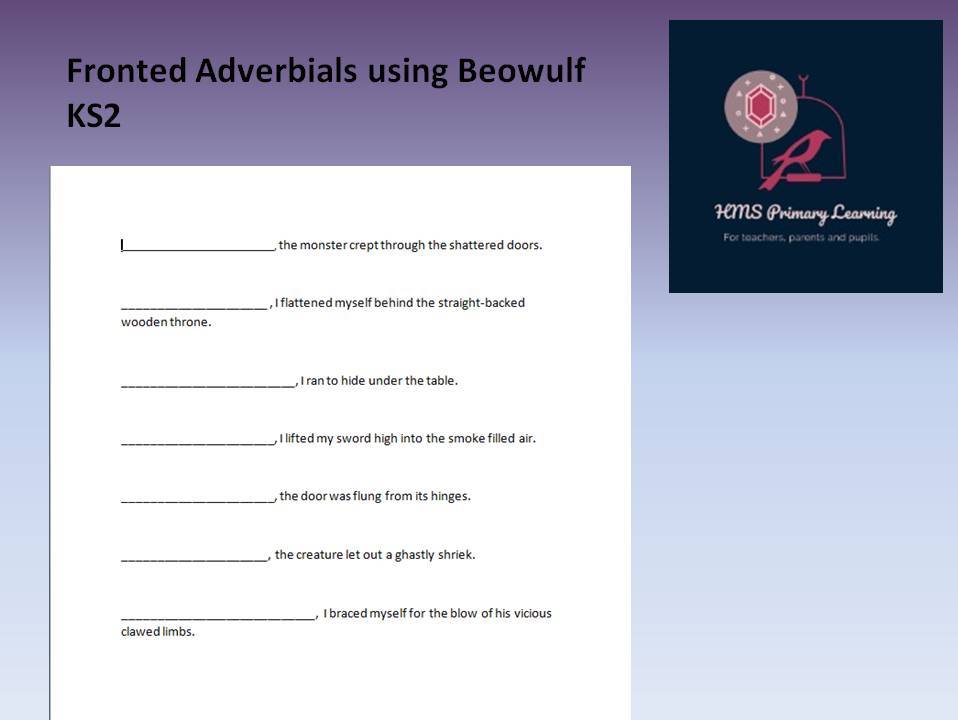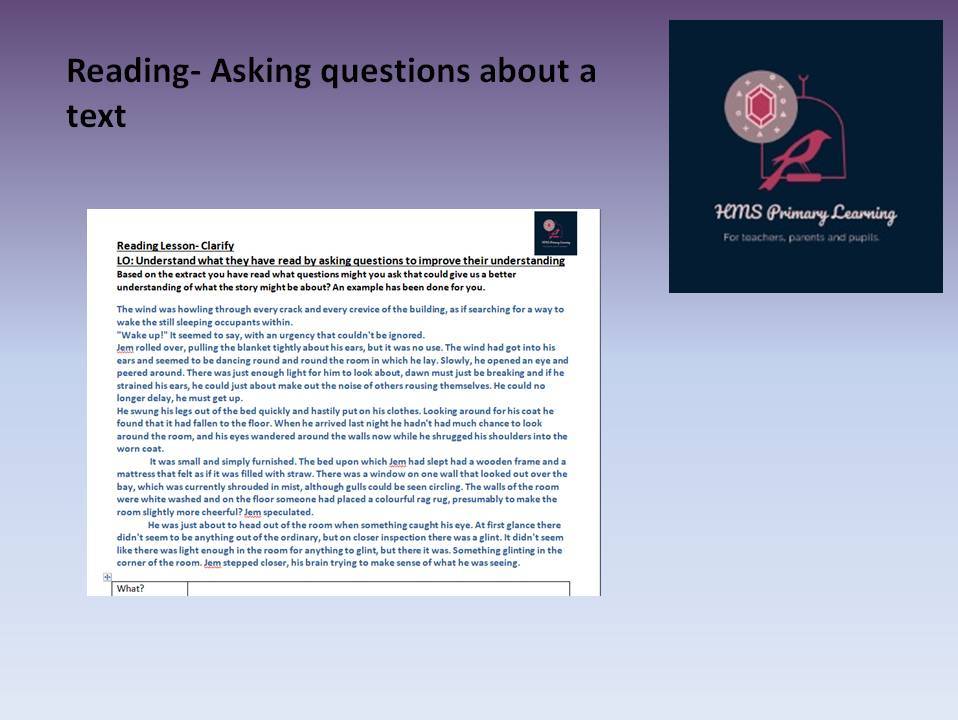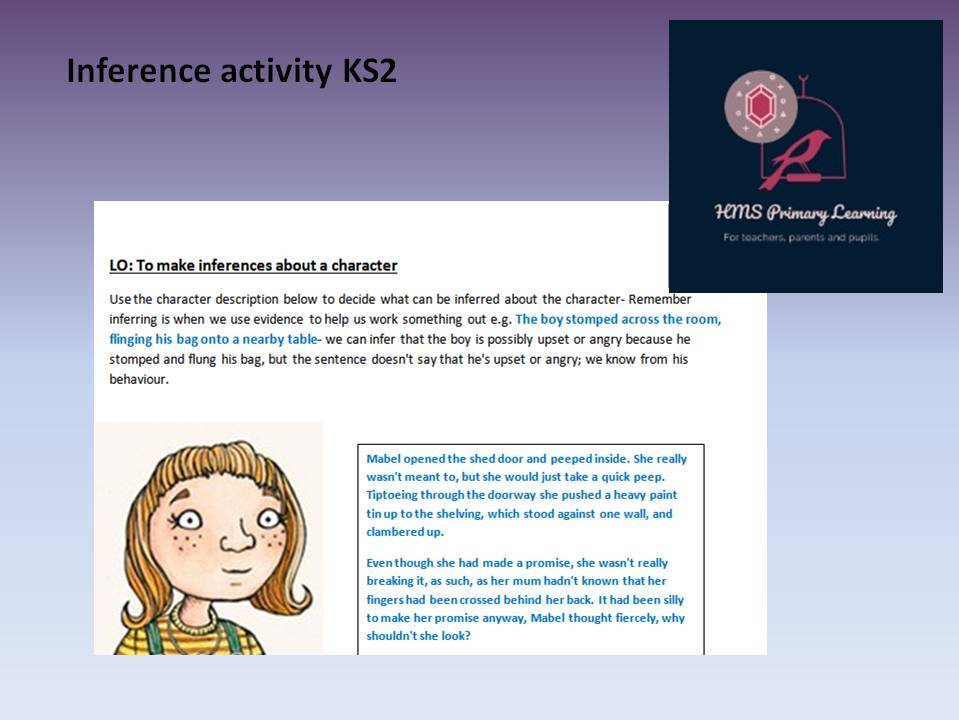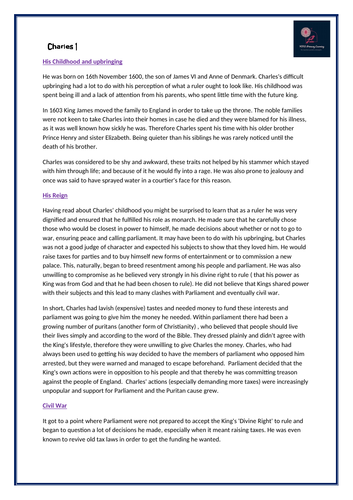43Uploads
10k+Views
1k+Downloads
English

Myths and legends- Beowulf fronted adverbials
A resource sheet to aid pupils in developing sentences using fronted adverbials with commas . The story of Beowulf is used as stimulus. Pupils must add their own adverbial phrases to the beginning of given sentences. How many ways can they rewrite the sentences with different openers? How does the effect change with their choice of opener? Planning and smart board are available to accompany this resource.

Reading activity- Asking questions about a text
A resource to ensure that pupils are thinking about a text full and are able to ask questions about it. Pupils use the question words provided to use as a starting point for generating questions about their given text.

Beowulf relative clause activity
An activity to help pupils identify and understand the use of relative clauses through the story Beowulf (Morpurgo’s version). Using examples from the text, pupils find the relative pronoun that will lead them to identify the relative clause. They then have a go at creating some examples of their own, using the examples as inspiration/support. This activity is suggested for year 5 and up, although it could be adapted for certain year 4 groups.

Inference activity KS2
An activity for make inferences about a character using an extract. This resource is suitable for KS2, or KS3 needing support with inference.

Children of the New Forest Chapter One
An abridged version of Children of the New Forest (chapter one). Having looked for suitable books when teaching the English Civil War to KS2 pupils I found that there was little to choose from. Although Children of the New Forest is a fantastic story, the lengthy nature of Victorian writing meant that it was a challenge to enable the pupils to both understand the language itself, and read sufficient of the story to gain enough from the plot. Therefore, as the book is in the public domain and not subject to copyright laws, I have abridged the first chapter, with the intention of looking at the whole book. Comprehension and reading activities to accompany this book will follow.
In this chapter I have highlighted certain words that teachers may wish to use for dictionary work, or pause to discuss (a resource for this will follow).
I hope that this will prove useful to someone and would value any feedback.
Bundle

Reading- inference character activities
An activity for make inferences about a character using an extract. This resource is suitable for KS2, or KS3 needing support with inference.
This bundle includes 3 different inference character extracts for pupils to use. One is more difficult than the other two and labelled HA.

Inference activity- character based KS2/3- Easier (1 star challenge level)
Character based inference activity aimed at KS2/3 that helps pupils develop their understanding of inference, which lots of pupils find a difficult concept. The activity starts by encouraging pupils to make observations about an image, which they then use to ‘infer’ details about the character image. Examples are given as guidance.

Year 4- Charles I information sheet
Information sheet on the life and execution of King Charles I. Can be used independently or in conjunction with Year 4- Charles I biography planning and resources.

Children of the New Forest- story writing (characterisation)
A sequence of lessons uses The Children of the New Forest by Captain Marryat. This book was used as it tied in with topic work on the English Civil War. This unit focuses on looking at characters within the book and using them to develop dialogue. This resource is available as part of a bundle with additional resources, including smart board.

Reading activity- summary
A useful template for supporting pupils write a summary. By using the boxes in the left hand column pupils are prompted to prove the next piece of information leading to a coherent summary of a text/extract. Suitable for any year group and can be made easier or more challenging through the choice of text being used.

Reading activity- Asking questions about a text
A resource to encourage pupils to think about how they approach questions involving text. This resource gives pupils the opportunity to use questions to generate their own text based on the answers they generate to alloted questions.

Beowulf reading activity
An inference activity linked to the story of Beowulf. Pupils will need to use an image to determine firstly, what they can see within the image and secondly what they can infer from this.

Beowulf inspired legend boxed planning format
Planning using a boxed format where pupils can first outline the story of Beowulf, idenifying themes that they can then imitate when planning there own story/legend side by side. Suitable for year 4 and up although the format can be adapted for any story writing.

Beowulf reading into writing- inference
This resource encourages pupils to put themselves in place of the characters during the first attack on the hall Heorot. They must consider what their chosen character might think and feel as well as detailing how they reacted. It is an opportunity for pupils to continue to develop their ability to extend sentences as well as use their knowledge of the text to infer possible character thoughts and feelings. This resource would be suited to year 3/4 and up.

Cloze activity smart board accompaniment
An accompanying cloze procedure resource to support the identification of nouns, their uses and how they can support narrative . This resource can also be used to address other story writing features such as openings and setting development.

Cloze procedure activity
A cloze procedure activity where pupils have to fill in the spaces using nouns. This is a useful activity for identifying and using nouns, but also can be used as a model for story openings where characters are being introduced amidst action.

Inference activity KS2 (HA)
An activity for make inferences about a character using an extract. This resource is suitable for KS2, or KS3 needing support with inference.
Bundle

Cloze procedure activity
A cloze procedure activity where pupils have to fill in the spaces using nouns. This is a useful activity for identifying and using nouns, but also can be used as a model for story openings where characters are being introduced amidst action.

Reading activity- Inference
Activity sheet for developing inference skills through interpreting different characters. The aim of the session is to produce a character description that includes character qualities, physical appearance and ideas about what the character’s back story might be based on the initial ideas pupils have gathered.

Children of the New Forest - Story writing- historical setting smart board
A smart board to accompany a sequence of four lessons on historical settings using the Children of the New Forest as stimulus. This resource also includes a weekly carousel for guided reading with suggested activities.




















